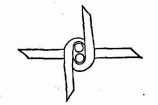
IOWA BARB STEEL-WIRE CO. v. SOUTHERN BARBED-WIRE CO. and others.1
Circuit Court, E. D. Missouri.
February 7, 1887.
PATENTS FOR INVENTIONS—BARBED WIRE FENCES.
Letters patent No. 192,225, granted to Arthur S. Burnell, June 19, 1877, for an “improvement in barbed-wire fences,” held valid, and infringed by wire fencing in which each prong passes between the strands, and is wound tightly around one of them, but not around the other prong.
In Equity.
Suit for the infringement of letters patent No. 192,225, granted to Arthur S. Burnell, June 19, 1877, for an “improvement in barbed-wire fences.” The claim of the patent is as follows:
“A barb for double-strand cable-wire fences, composed of two pointed pieces of wire, each of which passes over a strand of the cable, thence between its strands, and reciprocally binds the other wire to the strand of the cable, wherefrom the points of the wires project as from a center, substantially as set forth.”
The following drawing, which is a copy of fig. 3 of the drawings accompanying the specification, shows the prongs in position:

Each of the prongs of defendant's barb, which passes between the strands, is wound tightly around one of the strands, but does not pass 864around the other prong. The bights of the Burnell prongs each incloses the other prong and one of the strands.
John R. Bennett, for complainant.
J. M. Holmes and Walker & Walker, for defendants.
TREAT, J. As to patent No. 192,225, issued to A. S. Burnell, dated June 19, 1877, and which is the patent sued on, the court holds the same to be valid; also that defendant infringes the same.
Usual decree for perpetual injunction, and the case is referred to Hon. T. C. Reynolds, master in chancery, to ascertain and report profits and damages.
1 Edited by Benj. F. Rex, Esq., of the St. Louis bar.
This volume of American Law was transcribed for use on the Internet
through a contribution from Google. 